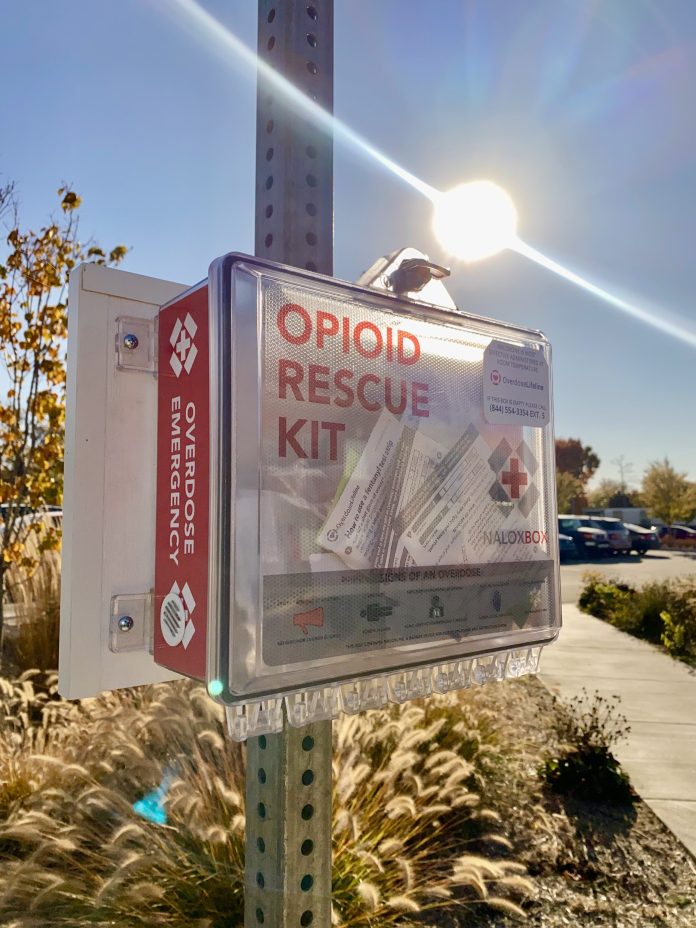
DePauw has become Indiana’s first college to install a Naloxbox on its campus, providing both DePauw students and the Greencastle community with access to naloxone, the life-saving drug that can rapidly reverse an opioid overdose. DePauw’s initiative to combat the drug overdose epidemic set a precedent for higher education throughout Indiana.
The installation of the NaloxBox is made possible by DePauw’s partnership with the Overdose Lifeline, an Indianapolis-based nonprofit organization founded in 2014.
Julia Proctor, DePauw’s associate dean of student wellness, commends the Overdose Lifeline for their work across the state and is grateful for their contribution to campus.
“We are grateful to the Overdose Lifeline for its work to educate and protect individuals from the harms related to opioid misuse,” she said.
Justin Phillips, executive director of Overdose Lifeline said, “Overdose Lifeline is excited to have the partnership with DePauw University, allowing for access to this life-saving medication. In the current overdose crisis, individuals are overdosing from more than just opioids due to the presence of fentanyl in all drugs. This access will save lives.”
The NaloxBox is located at the parking lot entrance next to Bishop Roberts Hall, at the corner of College and Olive streets. To access naloxone, students can open the NaloxBox and retrieve one or more kits. The kits contain a dose of naloxone in the form of a nasal spray, instructions on how to administer the nasal spray, and information about local resources for those suffering from a drug overdose or addiction. The NaloxBox is monitored by DePauw Health Wellness Center staff to ensure that it is always stocked. To prepare students and staff in case of emergency, DePauw Student Government will host naloxone training on Wednesday, Oct. 26 from 11 a.m. to 1 p.m. in Stewart Plaza.
The installation of a NaloxBox on DePauw's campus comes as a response to the surge of drug overdoses and deaths in Indiana and nationally in recent years. In 2020, nearly 92,000 people died from drug-involved overdose nationally, from both illicit drugs and prescription opioids, according to the Centers for Disease Control and Prevention (CDC). 56,516 of those reported overdose deaths were due to synthetic opioids other than methadone, like fentanyl.
Indiana is not exempt from this national and statewide epidemic as statistics continue to sound an alarm. For the first time in history, the annual number of Indiana residents who have died from drug overdoses has surpassed the number of Indiana residents who have died in motor vehicle accidents, according to a publication by the IU School of Medicine, with data taken from the CDC. Indiana saw 2,321 deaths from a drug overdose in 2020 and the state is currently ranked #10 in the U.S for highest drug use and addiction, according to data collected from the U.S. Census and the CDC.
The national rise in overdose deaths can also be seen in the local Greencastle community, with Putnam County experiencing nine deaths due to drug overdose in 2021, a 125 percent increase from the county’s last recording of 4 deaths in 2016, according to the Indiana Department of Health.
“This is the first time in recorded history that the teen drug death rate has seen an exponential rise,” addiction specialist Joseph Friedman in a journal for UCLA Health, who accredits the high toll almost entirely to counterfeit pills, said.
According to Friedman, “These counterfeit pills are spreading across the nation, and teens may not realize they are dangerous.” DePauw Wellness sent out an email on October 7 to caution students about counterfeit pills, and provided them resources through the Drug Enforcement Association’s (DEA) ‘One Pill Can Kill’ campaign.
“If a pill is not prescribed by a licensed medical professional and dispensed by a licensed pharmacist, you cannot be confident about whether it is fake or real,” Proctor said in the email.
According to DePauw’s drug and alcohol awareness policy, if a student or community member is concerned someone may be experiencing a drug overdose, they should call 911 immediately and administer naloxone if it is available to them. Students are protected from violations of DePauw’s alcohol and drug policy through the University’s Medical Amnesty if they “Call, Stay and Cooperate.”
According to Overdose Lifeline, an individual who has taken drugs prior to calling 911 and administering naloxone to a person who has overdosed is protected under Aaron’s Law so long as they “act in good faith.”
Students who are struggling with any kind of substance abuse are encouraged to get in contact with Counseling Services at 765-658-4268. To find other resources or access other treatment services in your area, you can text your zip code to 435748 (HELP4U). To find other locations with accessible naloxone, visit www.OverdoseLifeline.org.


